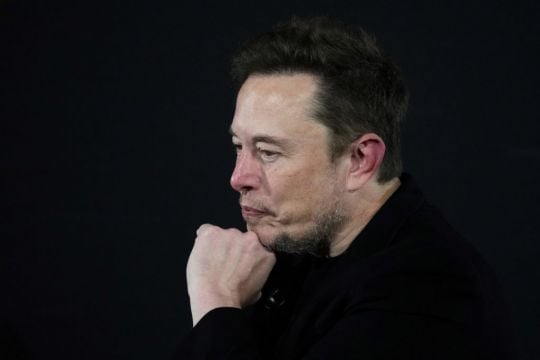Elon Musk’s tempestuous tenure at X is to continue in 2024 as the billionaire and the social media platform face ongoing issues around online safety regulation, misinformation and revenue concerns.
Since taking over Twitter – as the site was formerly known – in October 2022, Musk has faced a string of controversies, including around his treatment of staff and mass job cuts at the firm, and the site’s changing approach to moderation.
The disruption has caught the attention of regulators and spooked advertisers, leaving X heading into 2024 in the precarious position of facing regulatory penalties – including fines – while also dealing with falling advertising revenue.

One of the most pressing issues of the new year will be the European Union’s investigation into X, alleging a breach of rules by the platform in a number of areas including stopping illegal content and disinformation.
The proceedings have been launched under the Digital Services Act (DSA), tough new tech laws introduced by the EU which require the biggest platforms to protect their users against extreme and harmful content.
Failure to do so can mean large fines or a service being suspended in the EU – outcomes X could not afford to face.
The EU first began looking into X in October over the possible spread of terrorist and violent content in the wake of the conflict in Gaza, with X responding that it had removed hundreds of accounts from the platform.
Now it has launched a formal investigation, and also wants to scrutinise the effectiveness of the site’s Community Notes feature, which allows others to comment on the accuracy of posts, a system X and Mr Musk argue helps combat disinformation.
The findings of that investigation could trigger major upheaval for Mr Musk and X.
But ever since Mr Musk completed his takeover there have been questions about extreme material on the site.
A number of watchdogs and online safety groups have repeatedly flagged concerns about harmful and abusive posts circulating freely, while Mr Musk has been criticised for his free speech approach to running the site, and for laying off many of the site’s moderators.
He has also been criticised for allowing previously banned users, including conspiracy theorist Alex Jones and far-right figures such as Tommy Robinson, back onto the platform, and for reposting or interacting with controversial posts himself.

And with the UK’s Online Safety Act now in place and likely to begin to come into force towards the end of the year, X could be facing even more regulatory questions in the months to come.
But, the scrutiny has not just been coming from regulators – many advertisers have pulled back from the platform as a result, with Mr Musk accusing a campaign group in the US of trying to kill the social network and driving advertisers away by claiming the site was antisemitic by failing to remove hateful content.
Mr Musk himself has admitted the advertiser exodus has cost the social media company “billions” of dollars in revenue, and in an interview in early December, he acknowledged that the advertiser boycott could even bankrupt the firm.
As a result, 2024 is likely to see X attempt to diversify in order to uncover new revenue streams – most likely through more projects to turn the platform into a so-called “everything app” – a one-stop place for everything from social media to online payments, entertainment and other goods and services.
X has already launched a range of new subscription-based options and Mr Musk introduced a new audio and video calls service this year.
Meanwhile, the billionaire has started streaming himself playing video games on the site more often, which some commentators have suggested is an attempt to push more X users to do the same and rival apps such as Twitch.
All this turbulence comes as the site prepares to face potentially one of its biggest tests in years – and certainly since Mr Musk took over – in the form of multiple major elections.
2024 will see some of the biggest democracies in the world go to the polls, including the United States and probably the UK, where a general election is due before January 2025.
X is likely to play a key role in messaging reaching the public, just as it has in elections past when it was known as Twitter.
But the concerns around the site’s ability to combat misinformation and disinformation, and indeed fears in some quarters that Mr Musk’s absolute free speech mantra will allow fake and misleading content to appear online could have substantial implications.
In a big year of elections around the world, governments are working with social media firms to combat the spreading of false or mislead information online.
But any misinformation incidents in the run-up to any of the major elections will likely increase the pressure further on Mr Musk to change his approach at X, during what is shaping up to be a pivotal year for the company, and Mr Musk himself.







